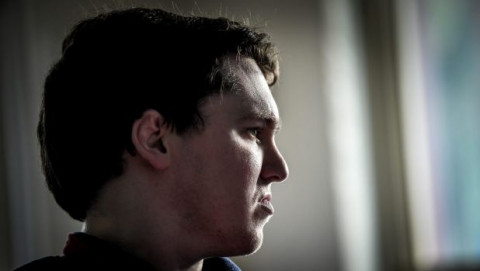
"It was supposed to offer hope, but that's just been trashed".
It's not the way you'd expect the head of one of Victoria's peak disability groups to describe Australia's rapidly growing national scheme for people with disabilities. Alexander Curotte, 31, has become withdrawn and depressed since the switch to the NDIS, his parents say. Photo: Justin McManus
But Kevin Stone has had a gutful. At every meeting he goes to, the stories are the same.
Exhausted parents tell him about adult children who have lost funding for their day program, transport or cookery classes.
Alexander has severe autism and other disabilities. Photo: Justin McManus
Or inexpert planners who draw up disability plans over the phone, and never meet the person whose life they shape.
So for the first time Mr Stone, head of the Victorian Advocacy League for Individuals with Disability (VALID), has publicly slammed the "mean-minded" National Disability Insurance Scheme.
"It's an absolute corruption of what the NDIS is supposed to be. Each person is supposed to be treated as an individual, but in order to get everyone through, they have cut heaps of corners," Mr Stone says. "You can't put our clients through a cookie-cutter approach."
The quietly spoken advocate is not one to make such statements lightly. For the past three years he has been on Victoria's NDIS implementation task force, and the intellectual disability reference group for the national scheme.
And it's not everyone on the NDIS that Mr Stone is concerned about.
For people with relatively straightforward needs it has been a boon, particularly those who weren't getting any disability support before, he says.
But for the people he supports who have an intellectual disability, autism and "challenging behaviours", the NDIS has ushered in a period of greater bureaucracy and neglect, he says.
Challenging behaviours mean the person can harm themselves, injure others or damage property when they are distressed, often because they have been traumatised in their early lives.
Planning their support takes time, and requires great patience and expertise.
But Pascoe Vale residents Peter and Paula Curotte say these have not been evident in the treatment of their 31-year-old son, Alexander.
They entrusted Alexander to the care of the Department of Human Services at age 11, after they found it was impossible to manage his behaviour at home.
They made the "least worst decision" to protect his brothers and sisters, and it's one they now regret, says Ms Curotte.
Alexander suffered sexual and physical assault and neglect while in care. Years of trauma saw his behaviour deteriorate to the point he was moribund – strapped to a bed during stints in hospital and heavily medicated.
His parents were present on Friday when Opposition Leader Bill Shorten said Labor would lobby the Turnbull government to establish a commission on violence and neglect in the disability services sector, and make it a priority if elected.
Two years ago Alexander got a boost in his disability funding – from $20,000 to $143,000 a year – and his parents organised specialist care, such as art and music therapy, physio and occupational therapy.
Gradually, he became more engaged, calmer. He laughed. He was able to have outings, visit his parents' country holiday home and meet volunteers with service animals.
But the switch to the NDIS has shattered this fragile calm "like a piece of space junk falling through the ceiling", says Paul Curotte.
Alexander's parents weren't given the opportunity to review his plan.
"We took the rhetoric seriously. The NDIS was supposed to be a new world. But they've never met Alexander. Never sighted him, never been out to see him," says Mr Curotte.
He and his wife are satisfied with the amount of funding (more than $400,000 including accommodation costs), but say red tape means it is far less flexible than before.
Without consulting, the NDIS planner decided funding should be spent on staff to come each day and take Alexander into the community.
A fine idea in theory, says Ms Curotte, but recruiting and training these employees to understand Alexander's needs would take months. In the meantime that funding has sat there, almost untouched.
Ms Curotte has been unable to use it for specialist therapies, and so Alexander's programs have abruptly stopped. He has become withdrawn and depressed again.
Victorian Disability Minister Martin Foley says the federal government should fund a proper price for services to meet the need of Victorians with complex cases.
A spokesperson said the National Disability Insurance Agency (which is running the introduction of the scheme) will work with the Victorian government to ensure more effective support for people with complex needs during the transition to the NDIS.
"We have acknowledged the participant and provider experience can be improved and are committed to listening to feedback to strengthen the scheme as we continue to roll it out nationally," the spokesperson said in a statement.
The number of people with an intellectual disability and challenging behaviours is relatively low, about 500 in Victoria, Kevin Stone estimates.
"I've been working with these guys for 40 years or so," he says. "You don't get positive outcomes unless you put in proper expert training and support. But if you do, you can get amazing results."